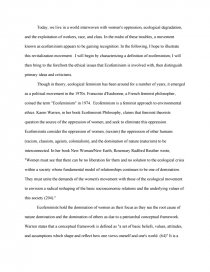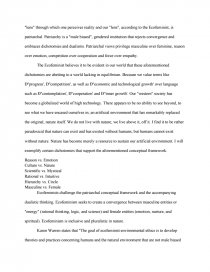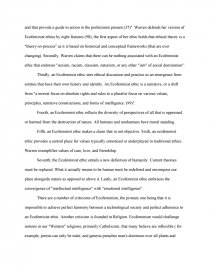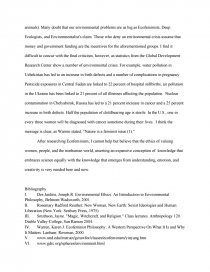Ecofeminism
Essay by review • October 27, 2010 • Research Paper • 1,228 Words (5 Pages) • 1,359 Views
Today, we live in a world interwoven with women's oppression, ecological degradation, and the exploitation of workers, race, and class. In the midst of these troubles, a movement known as ecofeminism appears to be gaining recognition. In the following, I hope to illustrate this revitalization movement . I will begin by characterizing a definition of ecofeminism; I will then bring to the forefront the ethical issues that Ecofeminism is involved with, then distinguish primary ideas and criticisms.
Though in theory, ecological feminism has been around for a number of years, it emerged as a political movement in the 1970s. Francoise d'Eaubonne, a French feminist philosopher, coined the term "Ecofeminism" in 1974. Ecofeminism is a feminist approach to environmental ethics. Karen Warren, in her book Ecofeminist Philosophy, claims that feminist theorists question the source of the oppression of women, and seek to eliminate this oppression. Ecofeminists consider the oppression of women, (sexism) the oppression of other humans (racism, classism, ageism, colonialism), and the domination of nature (naturism) to be interconnected. In her book New Woman/New Earth, Rosemary Radford Reuther wrote, "Women must see that there can be no liberation for them and no solution to the ecological crisis within a society whose fundamental model of relationships continues to be one of domination. They must unite the demands of the women's movement with those of the ecological movement to envision a radical reshaping of the basic socioeconomic relations and the underlying values of this society (204)."
Ecofeminists hold the domination of women as their focus as they see the root cause of nature domination and the domination of others as due to a patriarchal conceptual framework. Warren states that a conceptual framework is defined as "a set of basic beliefs, values, attitudes, and assumptions which shape and reflect how one views oneself and one's world. (64)" It is a "lens" through which one perceives reality and our "lens", according to the Ecofeminist, is patriarchal. Patriarchy is a "male biased", gendered institution that rejects convergence and embraces dichotomies and dualisms. Patriarchal views privilege masculine over feminine, reason over emotion, competition over cooperation and force over empathy.
The Ecofeminist believes it to be evident in our world that these aforementioned dichotomies are abetting to a world lacking in equilibrium. Because we value terms like Ð''progress', Ð''competition', as well as Ð''economic and technological growth' over language such as Ð''contemplation', Ð''cooperation' and Ð''inner growth'. Our "western" society has become a globalized world of high technology. There appears to be no ability to see beyond, to see what we have encased ourselves in; an artificial environment that has remarkably replaced the original, nature itself. We do not live with nature; we live above it, off it. I find it to be rather paradoxical that nature can exist and has existed without humans, but humans cannot exist without nature. Nature has become merely a resource to sustain our artificial environment. I will exemplify certain dichotomies that support the aforementioned conceptual framework.
Reason vs. Emotion
Culture vs. Nature
Scientific vs. Mystical
Rational vs. Intuitive
Hierarchy vs. Circle
Masculine vs. Female
Ecofeminists challenge the patriarchal conceptual framework and the accompanying dualistic thinking. Ecofeminism seeks to create a convergence between masculine entities or "energy" (rational thinking, logic, and science) and female entities (emotion, nurture, and spiritual). Ecofeminism is inclusive and pluralistic in nature.
Karen Warren states that "The goal of ecofeminist environmental ethics is to develop theories and practices concerning humans and the natural environment that are not male biased and that provide a guide to action in the prefeminist present (37)". Warren defends her version of Ecofeminist ethics by eight features (98); the first aspect of her ethic holds that ethical theory is a "theory-in-process" as it is based on historical and conceptual frameworks (that are ever changing). Secondly, Warren claims that there can be nothing associated with an Ecofeminist ethic that endorses "sexism, racism, classism, naturism, or any other "ism" of social domination".
Thirdly, an Ecofeminist ethic sees ethical discussion and practice as an emergence from entities that have their own history and identity. An Ecofeminist ethic is a narrative, or a shift from "a monist focus on absolute rights and rules to a pluralist focus on various values, principles, narrative constructions, and forms of intelligence. (99)".
Fourth, an Ecofeminist ethic reflects the diversity of perspectives of all that is oppressed or harmed from the destruction
...
...



